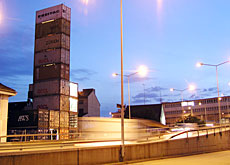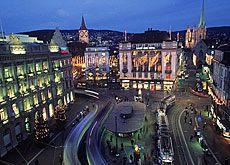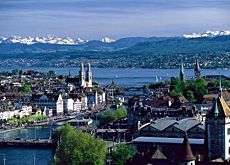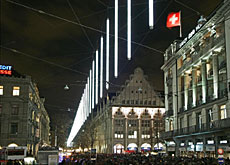Financial centre gets dose of creative flair

Zurich's traditional image as a grey centre of finance has been blown apart by a study that reveals a proliferation of creative cultural enterprises in recent years.
The number of people employed in fields such as art, fashion, design, entertainment and media recently rose by 10.2 per cent, outstripping the 0.5 per cent total growth in Switzerland.
The number of cultural enterprises in the city in the same five-year period from 1997 to 2001 mushroomed by 6.8 per cent to 4,300, employing around 28,000 people. This growth again significantly outshone the rest of the country.
Philipp Klaus, who works at Zurich University’s geography department, presented his findings in a new book entitled “City, Culture, Innovation”.
He discovered that the art and culture industry has eaten into the dominance of the banking, insurance and financial sectors and now makes up around one sixth of the total number of firms in Switzerland’s biggest city.
Before 1980 Zurich had a very limited cultural scene, according to Klaus. But this changed with the student-led youth movement in the 1980s that brought upheaval to the city along with an injection of underground culture.
“Zurich had a very boring image before 1980 because the elite did not trust new culture and thought it could be something dangerous,” Klaus told swissinfo.
“But the student uprising brought with it a new underground alternative culture including the punk movement. The events attracted artists, musicians and party organisers who gathered together in cultural clusters.”
Underground
The fledgling avant-garde cultural scene remained underground until the city’s “elite” realised that it could be used to promote Zurich and attract more investment.
The sea change in attitude led to a series of promotional events in the 1990s to highlight Zurich’s cultural attributes. This in turn inspired artists to transform themselves into entrepreneurs and start up businesses.
“The competition among cities to attract companies and rich people intensified and they saw that culture was a selling point,” Klaus said.
“People who had been squatting in abandoned industrial sites borrowing money off friends saw the opportunity to organise themselves into businesses.
“The result is that Zurich has been transformed from a rather dull, sterile city into a cool place for people to live. This is reflected in international city comparisons that usually pick Zurich as the best place to work.”
The cutting edge fashion enterprise, Freitag, is one such business that has grown rapidly from humble beginnings in recent years.
Brothers Markus and Daniel Freitag hit upon the idea in 1993 of making bags out of old truck tarpaulin, seat belts and tyres. The two of them started out in a rented flat overlooking a major arterial road out of Zurich.
International success
The fashion accessories have proved such a success in Switzerland that they now export their bags around the world, supplying such famous stores as Harvey Nichols in London and New York’s Bloomingdales.
Freitag, which in May opened a novel new store in Zurich made of old shipping containers, has expanded rapidly since the turn of the century and now employs 48 people.
“Many people are amazed at how creative Zurich has become, including ourselves on occasion,” Daniel Freitag told swissinfo.
“We have always been surrounded by artists, but the big change in the last few years is that both ourselves and many of our friends in the creative field now have companies and brands rather than hobbies.
“Zurich is a great place to start such a business because it is small enough to make networking easy and it is an international city at the centre of Europe.”
The only drawback to Zurich’s cultural enterprise boom, according to brother Markus, is that space is now running out in the old industrial sites favoured by such entrepreneurs.
“It is now getting very expensive to rent space. That is a pity because the garage scene is an excellent place to build your creative dreams,” he said. “Even companies like Microsoft started out in a garage.”
swissinfo, Matthew Allen in Zurich
Zurich is Switzerland’s financial centre and home to the stock exchange and multi-national banks and insurance companies.
There are some 26,000 businesses in Zurich and cultural enterprises number in the region of 4,300 – roughly a sixth of the total.
The period between 1995-2001 saw a rise of 2.7% in the total number of businesses in Switzerland compared to 1.7% in Zurich, according to Philipp Klaus.
In the cultural sector there were 5.8% more firms in the country and 6.8% more in Zurich.
Philipp Klaus wrote “City, Culture, Innovation” as part of his PhD studies at Zurich University.
He is also a partner in the INURA Zurich Institute for urban research.
Klaus works for Zurich University’s geography department and his main areas of interest involve urban development, planning and its relation to social, economic and cultural developments.

In compliance with the JTI standards
More: SWI swissinfo.ch certified by the Journalism Trust Initiative




You can find an overview of ongoing debates with our journalists here. Please join us!
If you want to start a conversation about a topic raised in this article or want to report factual errors, email us at english@swissinfo.ch.